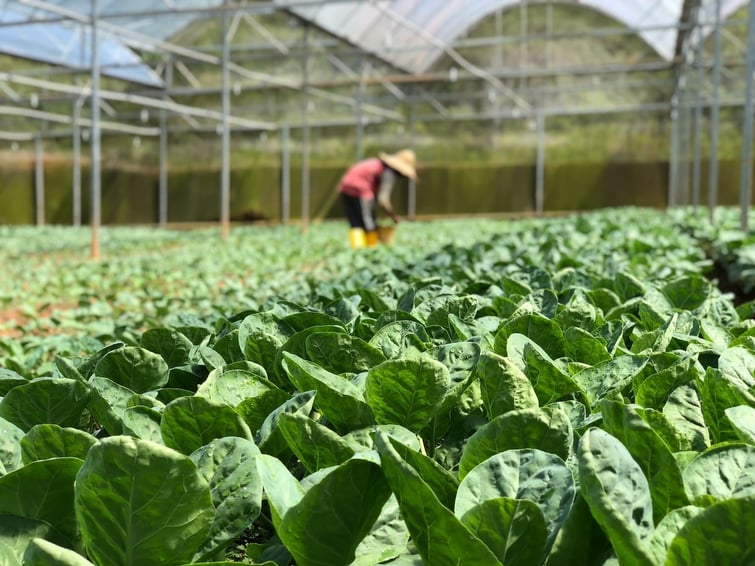6 Hospitality Trends for 2023: What They Mean for Your Business
The hospitality industry is constantly evolving. Discover the key hospitality trends for 2023 and how you can implement them into your business.
From sustainability to culinary diversity: Discover the hospitality trends for 2024 and how you can already implement them in your business today.

What and how will we eat in the future? What developments in the food industry can be observed? And what does the change in our food culture mean for agriculture, food production, commerce, and hospitality?
For several years now, food trend expert Hanni Rützler has been addressing these questions in her annual Food Report, which was published for the eleventh time this year. She analyzes what developments are expected for the F&B industry.
In this article we're exploring the hospitality trends for 2024. Take a look and get inspired for your own business:
1. Plant-based Food and Carneficionados
2. Local & Exotic
3. Female Connoisseurs
4. From Re-Use Food to Zero Waste to Circular Food
5. Regenerative Food
The Food Report 2024 provides a glimpse into the future of hospitality and reveals the trends and drivers expected to bring about changes in the foodservice industry in the upcoming year.
For 2024, two key topics can be identified: "The Future of Organic" and "A Changing Food Culture".
The first one addresses the question: Back to the roots or going forward with new technologies? This means that organic seems to be reaching its limits and requires a paradigm shift that combines technological innovations and ecological production.
The second topic deals with how climate change is increasingly bringing plant-based nutrition to the forefront of our food culture.
In addition to these key topics, the report highlights five food trends that will shape the food and hospitality industry in 2024.
Plant-based food has been a significant and successfully established trend for some time now and will continue to play a crucial role in 2024. This is primarily driven by two reasons:
On the one hand, there is a growing awareness of climate and the environment, especially among younger generations. On the other hand, an ethical shift is taking place concerning industrial animal farming and meat production. There is now an increasing demand for plant-based alternatives that provide culinary enjoyment without animal ingredients.
New improved technologies are leading to a more sustainable food production and are offering alternatives designed to mimic the taste and texture of animal products. Take precision fermentation for example: This technology makes it possible to produce cheese in the lab – without the need for cow's milk. Start-ups like Formo and New Culture show how this is done.

But it doesn't stop there. The trend surrounding plant-based food brings about another development: "Vegourmets". More and more gourmet restaurants are focusing on creating original dishes using vegan ingredients, where the animal-based elements are not missed.
However, there is also a counter-movement. The group of "Carneficionados" focuses on responsible meat consumption and opts for high-quality meat from sustainable sources. This is where the "Real Omnivores" come into play. They are open to all types of food, including more unusual ones like in-vitro meat or insects.
For restaurateurs, this trend provides an opportunity to expand their culinary offerings and differentiate themselves from the competition through innovative creations. For example, you can offer plant-based dishes that align with your concept or experiment with new substitute products. Overall, the idea is to shift the focus toward sustainable and ethical nutritional alternatives without completely excluding meat and fish.
Last year, there was already a shift in where we source our food. For 2024, the origin of food will become even more central. Two developments in particular are emerging: "Brutally local" and "Local Exotics".
The first one aims at the increasing popularity of traditional, local foods. It's no longer just about regional products but about local food that is produced sustainably in the immediate environment. The focus is on short supply chains, transparent production conditions, and resilient cultivation methods.
In contrast, Local Exotics refers to the local cultivation or breeding of exotic plants and animals. This approach sees a reshaping of the food market without restricting supply. Many foods that typically undergo long-distance transportation can be produced locally (e.g. Wagyu meat from Austria or figs from Germany).
To implement this trend in your business, you can, for example, establish partnerships with local farmers who produce their food fairly and sustainably. Then, highlight on your menu where the ingredients come from, demonstrating to your guests that you are committed to supporting local sourcing.
The foodservice industry is undergoing a transformation as more women rise to leadership positions and increasingly focus on social and environmental issues in their work.
This change can be seen in all aspects of the industry: from the food blog scene to foodservice start-ups to restaurants. In her Food Report 2024, Hanni Rützler mentions examples of female connoisseurs, such as Parvin Razavi, who was named Austria's Newcomer of the Year 2023 by Gault&Millau. In Mexico, for example, chef Elena Reygadas has launched a scholarship program specifically designed for women. The aim is to strengthen gender equality for women in the hospitality industry.
This female presence is shaping the entire industry and is not only promoting greater gender equality, but also pushing the industry towards a more sustainable and diverse future.

Another hospitality trend for 2024 deals with the sustainable management of food because too much food still ends up as waste. Globally, it amounts to 1.3 billion tons every year.
The re-use food approach aims to help recycle food. Concepts like "nose-to-tail" and "leaf-to-root" are gaining popularity in the foodservice industry, where all usable plant and animal products are utilized.
Related to this approach, waste reduction (zero waste) plays also a significant role. For individual consumers, for example, numerous package-free stores are available. Restaurateurs can opt for reusable packaging and reusable or sustainable materials (e.g. cloth napkins or packaging made of bamboo).
Taking it a step further, the circular food trend is not just about waste reduction but rather a new perspective on food. All components of products, such as peels or kernels, should be further processed and reintroduced into the biological cycle.
The regenerative food trend was already introduced in the Food Report 2023. Here, the focus is not only on what foods end up on our plates but also on how we produce them.
This approach focuses on promoting biodiversity, regenerating the soil, and minimizing the impacts of agriculture on climate change. Regenerative agriculture encompasses various practices aimed at helping soil regenerate and recover, such as the use of organic fertilizers and crop rotation.

In the hospitality sector, it is also worth to source food with a good energy and sustainability balance because more and more consumers are interested in how their food is produced. Platforms like Soilify or Klim serve as valuable resources, as they provide information about regenerative agriculture and facilitate networking among stakeholders.
So there they are: the hospitality trends for 2024, with a clear focus on sustainability and culinary diversity. From plant-based food to regenerative agriculture to local exotics, there are exciting opportunities for restaurateurs to successfully position their restaurants in the evolving food culture.
However, as with all trends, it's essential for restaurateurs not just to blindly follow them. Instead, it's important for them to ask themselves what goals they want to achieve with their business and who they want to target. Only then can they choose a trend that best aligns with their unique concept and caters to their guests' preferences.
The hospitality industry is constantly evolving. Discover the key hospitality trends for 2023 and how you can implement them into your business.
Learn about the top hospitality trends for 2025 and discover helpful tips on how to apply them in your business.
Digital employees are a very relevant topic – also in the hospitality industry. Find out how to tackle this issue in your business.
Make sure you never miss out on updates and trends about digitalization in the hospitality industry by subscribing to our monthly newsletter. You will receive useful information delivered directly to your inbox.